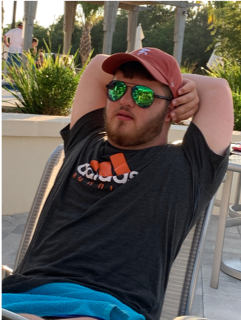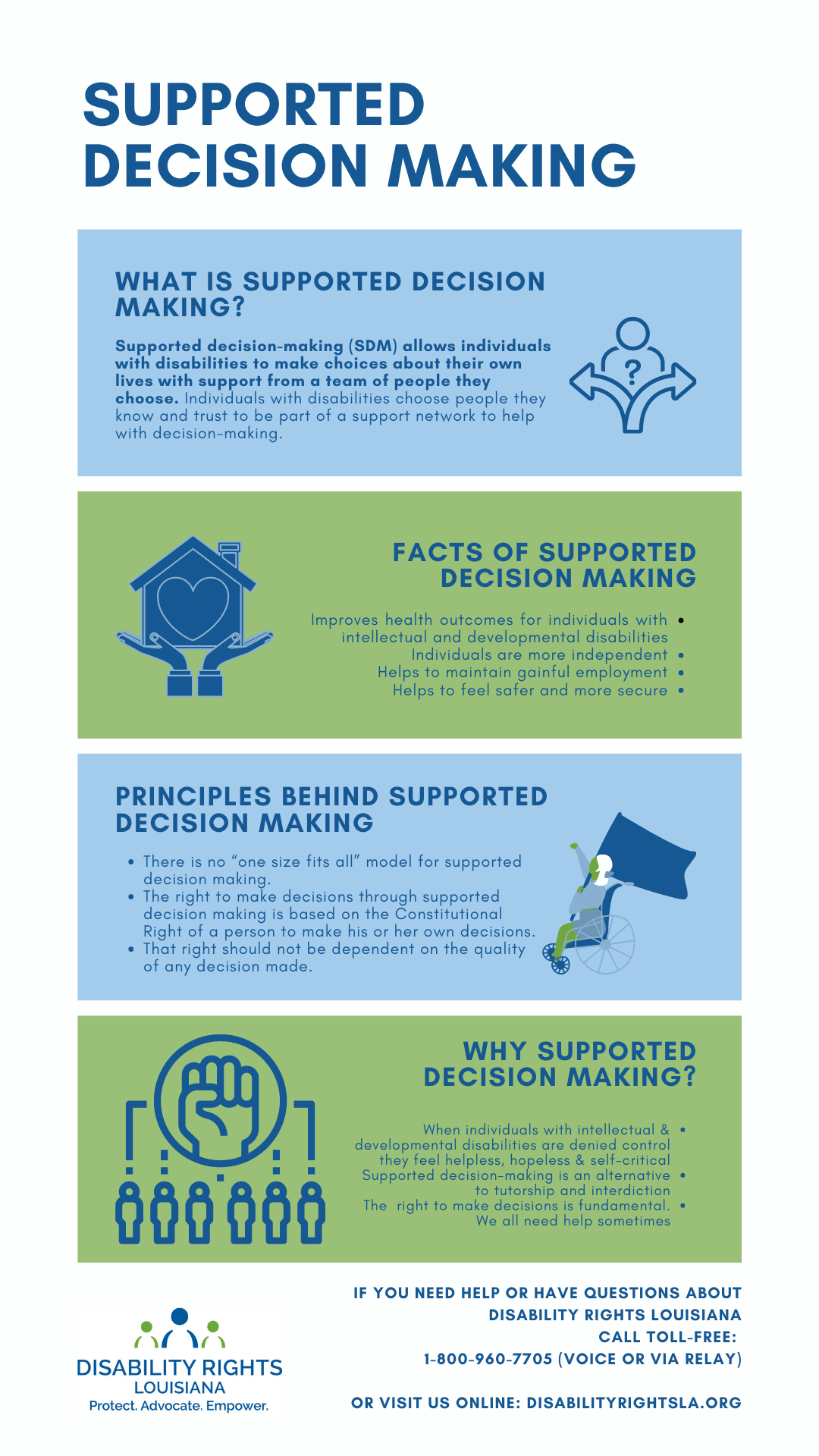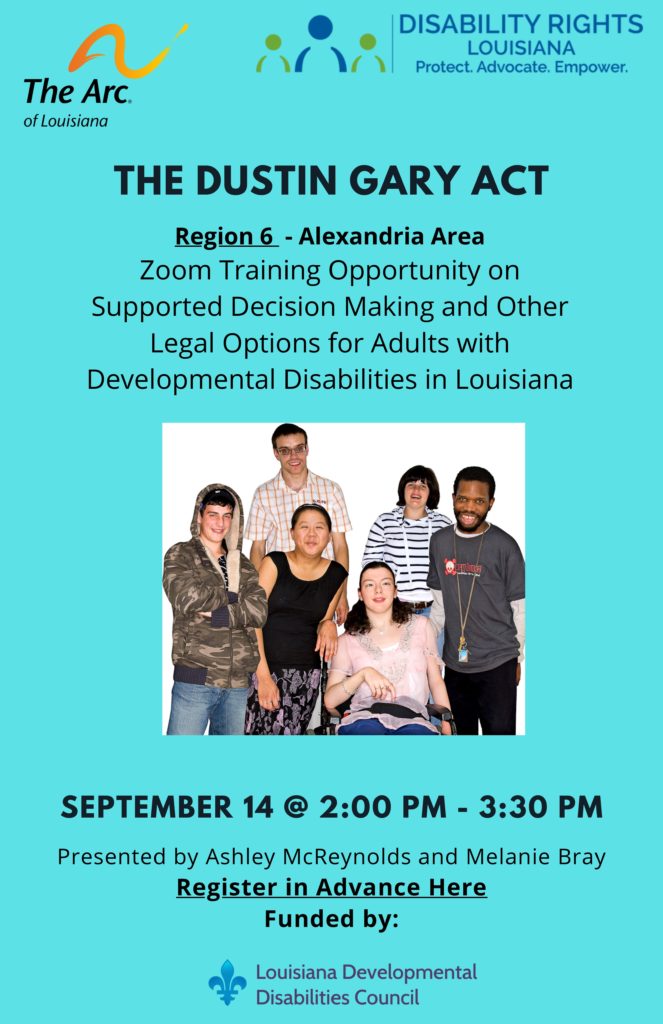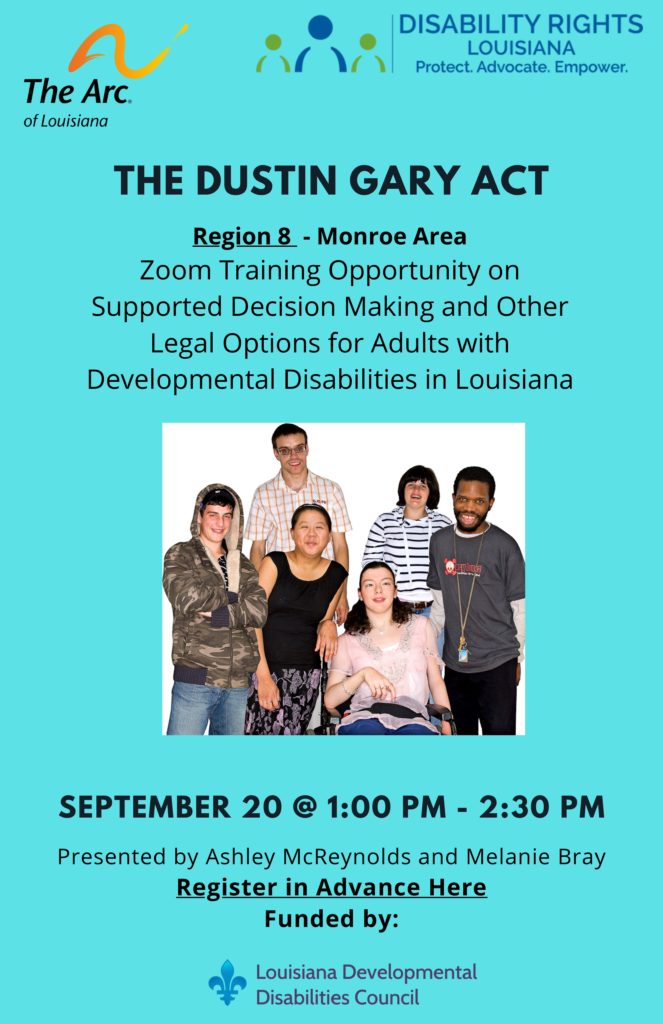Alternatives to Legal Status Changes
Alternatives to Interdiction or Tutorships:
- Special Education – Transfer of Rights
- Representation & Mandate (Power of Attorney)
- Supported Decision Making
- Advanced Directives
- Representative Payee
- Joint Bank Accounts
- Special Needs Trusts
- Able Act
- Medical Consent Law (Hierarchy of Consent)



Representation & Mandate (also known as Power of Attorney) and Advanced Directives
Louisiana law allows you to give another person the legal authority to perform certain activities for you and/or make decisions for you as if you were acting for yourself. This allows the individual to designate another person to assist with specifically identified activities, but does not remove the individual’s right to make decisions for themselves.

Representative Payee
A representative payee, or substitute payee, is a person who acts as the receiver of United States Social Security Disability or Supplemental Security Income for a person who is not fully capable of managing their own benefits, i.e. cannot be their own payee. Find additional information by visiting https://www.ssa.gov/payee

Able Accounts
An ABLE account, also known as a 529 ABLE or 529A account, is a state-run savings program for eligible people with disabilities that shelters the individual from eligibility concerns for programs while allowing for money to be saved for the individual’s benefit. Rules governing ABLE accounts are codified in Internal Revenue Code section 529A, which was enacted by the Achieving a Better Life Experience Act in 2014. For more information, visit the ABLE National Resource Center: https://www.ablenrc.org/

Medical Consent Law
Louisiana law has a medical consent law which allows someone other than the individual to consent to medical treatment when the individual lacks capacity to provide consent for themselves. A determination of capacity is made by the medical professional. The law may be found in Louisiana Revised Statute 40:1159.4 and provides the following hierarchy of consent:
- Hierarchy of Consent for Surgical/Medical
- Adult, for himself.
- Judicially appointed curator/tutor.
- Spouse.
- Adult child of patient.
- Parent.
- Sibling.
- Other relatives.
*Please refer to the above referenced statute for the full list and complete language.

Supported Decision Making (aka The Dustin Gary Act)

Supported decision-making (SDM) is often defined as supports and services that help an adult with a disability make his or her own decisions by relying on trusted friends, family members, professionals, and others. The legislation for SDM was passed in August 2020 and may be found in Louisiana Revised Statute 13:4261.101 through 4261.302. The passage of SDM also amended the interdiction law to add a requirement to show that less restrictive options were considered and tried and failed before filing for an interdiction. The purpose of SDM is to allow the individual to retain autonomy while receiving supports in areas that the individual feels are needed. SDM is a less restrictive alternative to interdiction!
A SDM Agreement should contain the name, address, and phone number of at least one supporter; a description of the decision making assistance that each supporter will provide to the individual; signatures of both the adult with a disability and the supporter(s); and a description of how multiple supporters will work together if there is more than one person.
For more information please visit the National Resource Center for Supported Decision Making and the Arc U.S.
The Arc also has a mentoring program to assist with the creation of a SDM plan and initial stages of enacting an agreement.
Supported Decision Making, Also Known as The Dustin Gary Act – A User’s Guide for Adults with Disabilities, Their Supporters, and Families –
This is a handbook created by The Arc of Louisiana and funded by the Louisiana Developmental Disabilities Council, containing comprehensive information regarding supported decision making, the process for creating an agreement, and practical information about how it works.
Upcoming Outreach & Training Events:
November 17th, 2021

On Wednesday, November 17th, DRLA Assistant Director of Legal Services, Melanie Bray, will be a speaker as part of the American Bar Association’s (ABA) webinar, Guardianship Replace or Reform: Where Do We Go From Here?
Ms. Bray will be one of six speakers, who will address the attorney’s role and ethical responsibilities in contested guardianships. Webinar attendees will hear a discussion featuring ways to uncover abuse by guardians, and the pros and cons of creative and novel approaches to decision-making, including the concept of replacing guardianship with person-centered systems.
The webinar is offered through the ABA website’s Free CLE Member Benefit Library, which offers Continuing Legal Education (CLE) credits to attendees. ABA members can attend for free, while attendance is $130 for non-members.
The webinar will begin at noon CST (1pm EST) on 11/17. You can learn more and register at this link: https://www.americanbar.org/events-cle/mtg/web/417286388/
September 20th, 2021
The Dustin Gary Act
Zoom training opportunity on Supported Decision Making and other legal options for adults with developmental disabilities in Louisiana.
Hosted by The Arc of Louisiana, Disability Rights Louisiana, and Families Helping Families of Southwest Louisiana.
Funded by the Louisiana Developmental Disabilities Council
Presented by Ashley McReynolds from the Arc of Louisiana and Melanie Bray from Disability Rights Louisiana.
January 12th, 11:00 am – 12:30 pm
February 23rd, 10:00 am – 11:30 am
March 16th, 6:00 pm – 7:30 pm
March 17th, 10:00 am – 11:30 am
May 5th, 1:00 pm – 2:30 pm
June 30th, 1:00 pm – 2:30 pm
August 23rd, 1:00pm – 2:30 pm
August 25th, 1:00pm – 2:30 pm
September 14th, 2:00pm – 3:30 pm
September 20th, 1:00pm – 2:30 pm – REGISTER HERE
![]()



